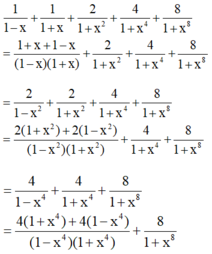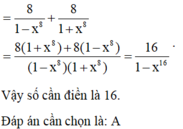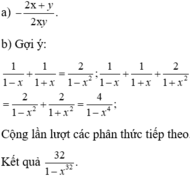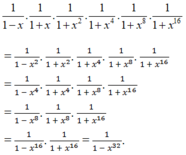Hãy nhập câu hỏi của bạn vào đây, nếu là tài khoản VIP, bạn sẽ được ưu tiên trả lời.

Áp dụng (a-b) (a + b) = a 2 - b 2 . Ta có:
M = 1 1 − x 2 . 1 1 + x 2 . 1 1 + x 4 . 1 1 + x 8 . 1 1 + x 16
= 1 1 − x 16 . 1 1 + x 16 = 1 1 − x 32

\(\dfrac{1}{x+2}+\dfrac{5}{2x^2+3x-2}\\ =\dfrac{1}{x+2}+\dfrac{5}{\left(2x-1\right)\left(x+2\right)}\\ =\dfrac{2x-1}{\left(2x-1\right)\left(x+2\right)}+\dfrac{5}{\left(2x-1\right)\left(x+2\right)}\\ =\dfrac{2x-1+5}{\left(2x-1\right)\left(x+2\right)}\\ =\dfrac{2x+4}{\left(2x-1\right)\left(x+2\right)}\\ =\dfrac{2\left(x+2\right)}{\left(2x-1\right)\left(x+2\right)}\\ =\dfrac{2}{2x-1}\)
__
`x^3+1` chứ cậu nhỉ?
\(\dfrac{-3x^2}{x^3+1}+\dfrac{1}{x^2-x+1}+\dfrac{1}{x+1}\\ =\dfrac{-3x^2}{\left(x+1\right)\left(x^2-x+1\right)}+\dfrac{1}{x^2-x+1}+\dfrac{1}{x+1}\\ =\dfrac{-3x^2}{\left(x+1\right)\left(x^2-x+1\right)}+\dfrac{x+1}{\left(x+1\right)\left(x^2-x+1\right)}+\dfrac{x^2-x+1}{\left(x-1\right)\left(x^2-x+1\right)}\\ =\dfrac{-3x^2+x+1+x^2-x+1}{\left(x+1\right)\left(x^2-x+1\right)}\\ =\dfrac{-2x^2+2}{\left(x+1\right)\left(x^2-x+1\right)}\\ =\dfrac{-2\left(x^2-1\right)}{\left(x+1\right)\left(x^2-x+1\right)}\)
\(=\dfrac{-2\left(x-1\right)\left(x+1\right)}{\left(x+1\right)\left(x^2-x+1\right)}\\ =\dfrac{-2\left(x-1\right)}{x^2-x+1}\)
__
a) \(\dfrac{1}{x+2}+\dfrac{5}{2x^2+3x-2}\)
\(=\dfrac{1}{x+2}+\dfrac{5}{2x^2+4x-x-2}\)
\(=\dfrac{2x-1}{\left(2x-1\right)\left(x+2\right)}+\dfrac{5}{2x\left(x+2\right)-\left(x+2\right)}\)
\(=\dfrac{2x-1+5}{\left(2x-1\right)\left(x+2\right)}\)
\(=\dfrac{2x+4}{\left(2x-1\right)\left(x+2\right)}\)
\(=\dfrac{2\left(x+2\right)}{\left(2x-1\right)\left(x+2\right)}\)
\(=\dfrac{2}{2x-1}\)
\(---\)
b) \(\dfrac{-3x^2}{x^3+1}+\dfrac{1}{x^2-x+1}+\dfrac{1}{x+1}\) (sửa đề)
\(=\dfrac{-3x^2}{\left(x+1\right)\left(x^2-x+1\right)}+\dfrac{x+1}{\left(x+1\right)\left(x^2-x+1\right)}+\dfrac{x^2-x+1}{\left(x+1\right)\left(x^2-x+1\right)}\)
\(=\dfrac{-3x^2+x+1+x^2-x+1}{\left(x+1\right)\left(x^2-x+1\right)}\)
\(=\dfrac{-2x^2+2}{\left(x+1\right)\left(x^2-x+1\right)}\)
\(=\dfrac{-2\left(x^2-1\right)}{\left(x+1\right)\left(x^2-x+1\right)}\)
\(=\dfrac{-2\left(x-1\right)\left(x+1\right)}{\left(x+1\right)\left(x^2-x+1\right)}\)
\(=\dfrac{-2x+2}{x^2-x+1}\)
\(---\)
c) \(\dfrac{1}{1-x}+\dfrac{1}{1+x}+\dfrac{2}{1+x^2}+\dfrac{4}{1+x^4}\)
\(=\dfrac{1+x}{\left(1-x\right)\left(1+x\right)}+\dfrac{1-x}{\left(1-x\right)\left(1+x\right)}+\dfrac{2}{1+x^2}+\dfrac{4}{1+x^4}\)
\(=\dfrac{1+x+1-x}{1^2-x^2}+\dfrac{2}{1+x^2}+\dfrac{4}{1+x^4}\)
\(=\dfrac{2}{1-x^2}+\dfrac{2}{1+x^2}+\dfrac{4}{1+x^4}\)
\(=\dfrac{2\left(1+x^2\right)}{\left(1-x^2\right)\left(1+x^2\right)}+\dfrac{2\left(1-x^2\right)}{\left(1-x^2\right)\left(1+x^2\right)}+\dfrac{4}{1+x^4}\)
\(=\dfrac{2+2x^2+2-2x^2}{1-x^4}+\dfrac{4}{1+x^4}\)
\(=\dfrac{4}{1-x^4}+\dfrac{4}{1+x^4}\)
\(=\dfrac{4\left(1+x^4\right)}{\left(1-x^4\right)\left(1+x^4\right)}+\dfrac{4\left(1-x^4\right)}{\left(1-x^4\right)\left(1+x^4\right)}\)
\(=\dfrac{4+4x^4+4-4x^4}{1-x^8}\)
\(=\dfrac{8}{1-x^8}\)
#\(Toru\)

a,Cách 1: (6/11 + 5/11 ) x 3/7 Cách 2 :(6/11 + 5/11) x 3/7
= 1 x 3/7 =6/11 x 3/7 + 5/11 x 3/7
= 3/7 = 18/77 + 15/77
= 3/7
b, Cách 1:3/5 x 7/9 - 3/5 x 2/9 Cách 2 :3/5 x 7/9 - 3/5 x 2/9
= 7/15 - 2/15 = 3/5 x (7/9 - 2/9 )
= 1/3 = 3/5 x 5/9
= 1/3
c, Cách 1:(6/7 - 4/7) : 2/5 Cách 2: ( 6/7- 4/7 ) : 2/5
= 2/7 : 2/5 = 6/7 : 2/5 - 4/7 : 2/5
= 5/7 = 15/7 - 10/7
= 5/7
d,Cách 1:8/15 : 2/11 + 7/15 : 2/11 Cách 2:8/15 : 2/11 +7/15 : 2/11
= 88/30 + 77/30 =(8/15+7/15) :2/11
= 11/2 = 1 : 2/11
= 11/2
Bài 2 cậu tự làm nhé !

11) Ta có: \(a^6+a^4+a^2b^2+b^4-b^6\)
\(=a^6-b^6+a^4+a^2b^2+b^4\)
\(=\left(a^2-b^2\right)\left(a^4+a^2b^2+b^4\right)+\left(a^4+a^2b^2+b^4\right)\)
\(=\left(a^4+a^2b^2+b^4\right)\left(a^2-b^2+1\right)\)
12) Ta có: \(x^3+3xy+y^3-1\)
\(=\left(x^3+3x^2y+3xy^2+y^3-1\right)-3x^2y-3xy^2+3xy\)
\(=\left[\left(x+y\right)^3-1\right]-3xy\left(x+y-1\right)\)
\(=\left(x+y-1\right)\left[x^2+2xy+y^2+x+y+1\right]-3xy\left(x+y-1\right)\)
\(=\left(x+y-1\right)\left(x^2-xy+y^2+x+y+1\right)\)
14) Ta có: \(x^8+x+1\)
\(=x^8+x^7-x^7-x^6+x^6+x^5-x^5-x^4+x^4+x^3-x^3+x^2-x^2+x+1\)
\(=x^6\left(x^2+x+1\right)-x^5\left(x^2+x+1\right)+x^3\left(x^2+x+1\right)-x^2\left(x^2+x+1\right)+\left(x^2+x+1\right)\)
\(=\left(x^2+x+1\right)\left(x^6-x^5+x^3-x^2+1\right)\)
15) Ta có: \(x^8+3x^4+4\)
\(=x^8+4x^4+4-x^4\)
\(=\left(x^4+2\right)^2-\left(x^2\right)^2\)
\(=\left(x^4-x^2+2\right)\left(x^4+x^2+2\right)\)

1) \(x^2-7x+6=x^3+1-7x-7=\left(x^3+1\right)-7\left(x+1\right)=\left(x+1\right)\left(x^2-x-6\right)\)
2) \(x^3-9x^2+6x+16\)
\(\left(x^3+1\right)-\left[\left(9x^2-6x+1\right)-16\right]\)
\(=\left(x^3+1\right)-\left[\left(3x-1\right)^2-16\right]=\left(x^3+1\right)-\left(3x-1+4\right)\left(3x-1-4\right)\)\(=\left(x^3+1\right)-3\left(3x-5\right)\left(x+1\right)\)\(=\left(x+1\right)\left[x^2-x+1-9x+15\right]=\left(x+1\right)\left(x^2-10x+16\right)\)
\(=\left(x+1\right)\left[x\left(x-2\right)-8\left(x-2\right)\right]\)\(\left(x+1\right)\left(x-2\right)\left(x-8\right)\)
3) \(x^3-6x^2-x+30\)
\(=x^3-5x^2-x^2+5x-6x+30\)
\(=x^2\left(x-5\right)-x\left(x-5\right)-6\left(x-5\right)\)
\(=\left(x-5\right)\left(x^2-x-1\right)\)
4) \(2x^3-x^2+5x+3=\left(2x^3+x^2\right)-\left(2x^2+x\right)+\left(6x+3\right)\)
\(=x^2\left(2x+1\right)-x\left(2x+1\right)+3\left(2x+1\right)\)
\(=\left(2x+1\right)\left(x^2-x+3\right)\)
5) \(27x^3-27x^2+18x-4=\left(27x^3-1\right)-\left(27x^2-18x+3\right)\)
\(=\left(3x-1\right)\left(9x^2+3x+1\right)-3\left(9x^2-6x+1\right)\)
\(=\left(3x-1\right)\left(9x^2+3x+1\right)-3\left(3x-1\right)^2\)
\(=\left(3x-1\right)\left(9x^2+3x+1-9x+3\right)=\left(3x-1\right)\left(9x^2-6x+4\right)\)
gửi phần này trước còn lại làm sau !!! tk mk nka !!!

\(x^4+\dfrac{11}{2}x^2+x+6=\left(x^4+4x^2+4\right)+\dfrac{1}{2}\left(x^2+2x+1\right)+\dfrac{1}{2}x^2+\dfrac{3}{2}\)
\(=\left(x^2+2\right)^2+\dfrac{1}{2}\left(x+1\right)^2+\dfrac{1}{2}x^2+\dfrac{3}{2}\)
Do \(\left\{{}\begin{matrix}\left(x^2+2\right)^2>0\\\dfrac{1}{2}\left(x+1\right)^2\ge0\\\dfrac{1}{2}x^2\ge0\end{matrix}\right.\) với mọi x
\(\Rightarrow\left(x^2+2\right)^2+\dfrac{1}{2}\left(x+1\right)^2+\dfrac{1}{2}x^2+\dfrac{3}{2}>0\) với mọi x
Vậy đa thức không có nghiệm











